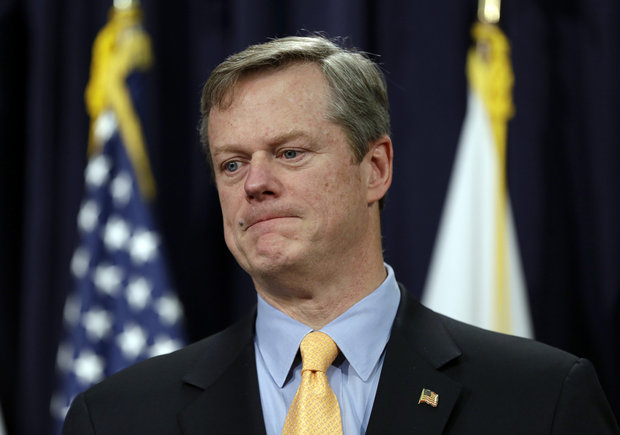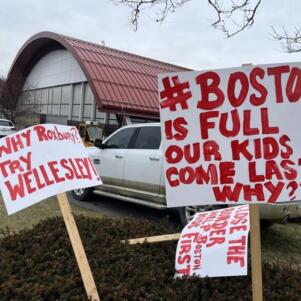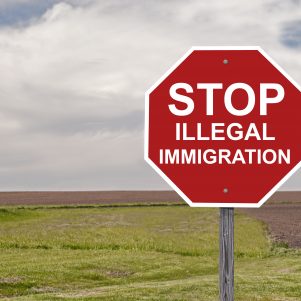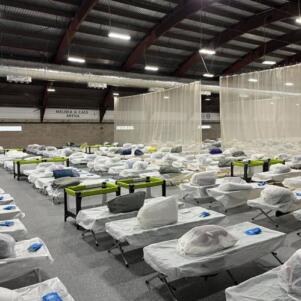Baker on Trump’s sanctuary city threats: “We’re a global commonwealth”
By Evan Lips | November 16, 2016, 11:17 EST
 Massachusetts Governor Charlie Baker
Massachusetts Governor Charlie Baker
BOSTON — A day after participating in a Republican governors’ conference in Florida and a week after President-elect Donald Trump’s stunning upset win, Gov. Charlie Baker indicated to reporters that he’ll back efforts to fight the predicted federal crackdown on sanctuary city policies protecting illegal aliens.
“I’ve said all along I think decisions about how communities want to manage public safety and community issues belong to them,” Baker said Wednesday morning. “It’s incumbent on our administration and congressional delegation to work hard to make sure that our state receives the federal support we’ve previously been able to secure.”
Trump has made it clear throughout his campaign that he supports penalizing cities that boast sanctuary city policies by withholding federal dollars from them.
“We’re a global community, we’re a global commonwealth, people need to feel welcome here and I can tell you point-blank that as governor I will continue to work with my colleagues in state and local government to ensure that everybody feels welcome here in the commonwealth,” he said.
Baker never used the official “sanctuary city” term when talking about the issue, which reporters repeatedly questioned him about throughout the 20-minute press conference.
“I’ve said many times I think the way local communities choose to ensure harmony and public safety in their own communities should be up to them,” Baker said at one point. “People choose a variety of ways to engage in that, and I support that, but my job as governor is to advocate for the commonwealth and that means everybody.
“I will advocate to ensure that Massachusetts continues to be treated fairly, along with the Congressional delegation, when it comes to federal grants and federal funds for cities and towns here in the commonwealth.”
Asked directly where he “opposes Trump’s plan,” Baker responded by saying he thinks “it’s a little early for us to get too far down the road here, because sometimes the details on this stuff matter.”
“But what I will say is that I believe a big part of my job as governor is to do what I can to advocate on behalf of our communities here in the commonwealth and I intend to do so.”
Baker frequently referenced Massachusetts as a “global community,” noting at one point that “there is simply no question that this state has a big footprint in all kinds of places around the world.”
“You have whole neighborhoods and communities that have developed all over the commonwealth, that represent cultures and points of view from all over the globe,” he added “I can tell you this — we are a welcoming state, we have always been a welcoming state, and being a welcoming state is what has made us strong and successful.”
Baker also referred to himself as a “community guy.”
“When I talk about the notion of community, I just don’t mean local communities, I mean all communities,” he said. “I think one of the things we all need to remember here as we go forward is that we are, for all intents and purposes, a country that is made up of communities that have always respected and appreciated what each community brings to the totality of what we are all about.”
Baker also fielded questions on a range of other issues:
On the conversations he had at the Republican governor’s conference, specifically with Trump’s running mate, Indiana Gov. Mike Pence:
“Gov Mike Pence also joined us for a private meeting that lasted about an hour. We talked a little about the election cycle but mostly we talked about the fact that we thought it would be important and he agreed for states to have significant voice in the policy apparatus of the new administration. Gov Pence, having been a governor himself, agreed that states are often what I would describe as being on the front lines for a lot of the decisions that get made on the federal level.
He made it clear to us that he will want to have a very deliberate and significant dialogue with governors and with states as the new admin moves forward.
We are a state, that between healthcare and education and energy, and defense, has a lot of interests in a lot of issues with respect to what happens at the federal level. My hope and my anticipation is that this open line of dialogue will be available to us and we will be able to work collaboratively with our Congressional delegation and with the new administration to ensure that the state’s interests are appropriately represented.”
On concerns that New Jersey Gov. Chris Christie’s apparent banishment from Trump’s transition team could signal that various GOP governors who did not back Trump could be cut out of the conversation:
“I don’t think so, Gov. Pence was very clear that he is very interested and that the president-elect is very interested in working collaboratively with the governors. I think at this point it’s important that we be proactive.”
On what his greatest current concern for Massachusetts may be:
“I think the biggest concern that I have is one that is shared by most of my colleagues around the country, which is an interest in seeing who gets appointed to a lot of the key positions and how the policy apparatus starts to develop. I’ve said many times when talking about my own administration is that people are policy. The folks you appoint to serve key roles in your administration represent for many people the first step in how you plan to govern.”
On what he thinks of the inclusion of Steve Bannon, executive chairman of Breitbart News, into Trump’s inner White House circle:
“I said that the president’s (Trump) made it clear he wants to unify the country post-election, and I said that most of Bannon’s previous remarks and activities are of a concern to me. But I’m going to take a page from President Obama’s book on this one, who said the other day that he thinks the Trump administration’s team should be judged by the totality of its appointments. Let’s see what else happens.”
On whether his more liberal positions on various social issues will make him an “outsider” when it comes to dealing with the Trump White House, specifically with respect to Indiana Gov. Mike Pence, who adopts a more conservative stance:
“We now have 33 Republican governors, that covers two-thirds of the states in the United States, that’s a lot of geography and it’s also a lot of different points of view from a lot of communities. The last few days I’ve spent a lot of time thinking about ‘E Pluribus Unum’ — out of the many, one — and my hope here is that we all keep that in mind as we go forward.
I believe that that is in fact what makes us strong, that whole notion of ‘out of the many — one.’
I’m concerned that this is getting lost in the post-election conversation.”
On whether the potential presence of government “outsiders” in Trump’s White House is a cause for concern:
“I think one of the biggest issues that frustrates people with Washington, generally, is the fact that people just go back-and-forth from legislative committees to administrations to lobbying organizations and the whole thing is just this big circle of insiders, and I hope that people in Washington respect that as they make decisions about who to put into some of these key jobs.
I mean, I talk to people all day long here in the commonwealth and believe me, there are a lot of people who think that Washington is an insider’s game. Whether that’s legitimate or not, they do. I think it’s going to be important for this administration to demonstrate that they are paying attention to everybody.
When I joined the Weld administration in 1991 which admittedly at this point is a million years ago, there were a lot of people who said at the time that, you know, ‘really bad decision by Gov. Weld — Baker didn’t have any experience in government, not to mention the fact that he was an outsider like all the rest’
I think most people would say that, in retrospect, I took the task and the job pretty seriously and did a pretty decent job. I think there is way too much pre-judging going on here and I think it’s important for all of us to take a page from what the president had to say the other day, which is let’s see what happens here, let’s judge people on the totality of their work.”
On his decision not to vote for either Trump or Clinton, and whether that choice “sets a bad example for the children”:
“I said early on that I had issues with both candidates and there was nothing that happened between the time I said that in March and the election that changed my mind on it. But I have a lot of friends who voted for Donald Trump, I have a lot of friends who voted for Secretary Clinton.
I participated on Election Day. I voted on ballot questions, I voted down-ballot.
You know what would have been a bad example? To not tell you who I would be voting for. My view on this was the best thing for me to do was to be honest about what I thought about all this. There are a lot of people who wrote people in. A lot of people. The bottom line is, the election is over. OK? The work of governing is what starts now. I think the most important thing for all of us to do is to remember that this is a new administration, they are just getting started. I thought the president said almost all the right things in his press conference the other day, and that’s because he’s walked in the same shoes that the nascent Trump administration has walked in.
The thing I’m going to worry about, here, is making sure, whether working with the delegation or trying to work directly with the new administration, that the interests and the concerns of the people — all the people — of the commonwealth are represented going forward.”
On policy subjects he believes that can bridge the divide between the Trump administration and his opponents:
“I think the infrastructure piece is one of the biggest opportunities for a bipartisan win I can think of. I think a major infrastructure bill represents what could be the biggest opportunity for people to find something they can agree on early.”
On concerns that Trump will significantly change the Affordable Care Act, especially with respect to Massachusetts residents:
“Massachusetts signed a five-year waiver with Health and Human Services about 10 days ago. That waiver represents a structured relationship between the commonwealth and the federal government moving forward. Massachusetts had a universal plan in place before the Affordable Care Act, it’s important to the people of Massachusetts that we can continue to be committed to that.
Remember, the president-elect has stepped back significantly from some of the earlier comments he made about the Affordable Care Act.
I’ve said all along I think there are adjustments that need to be made to the federal legislation. You also have the president-elect saying there are certain elements of Obamacare — and by the way, I’m going to call it what it is, the Affordable Care Act — but I think the president-elect has already said there are elements of the Affordable Care Act he thinks should be retained.”











